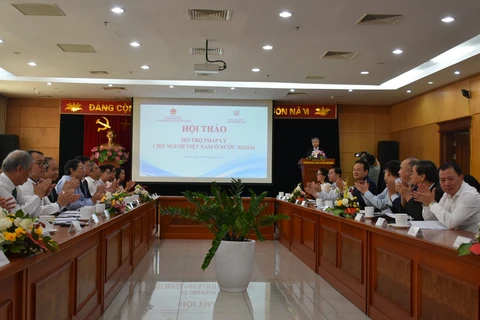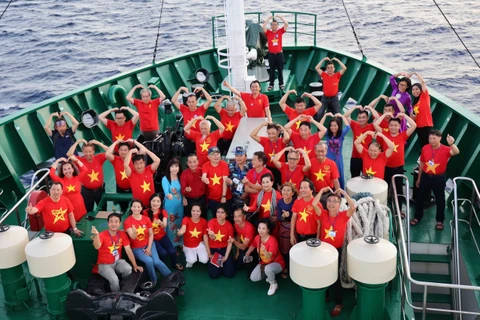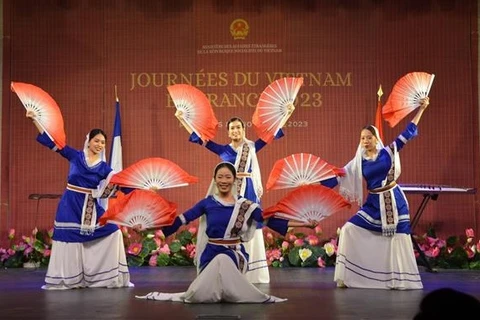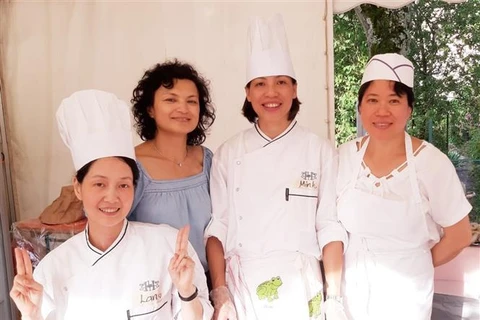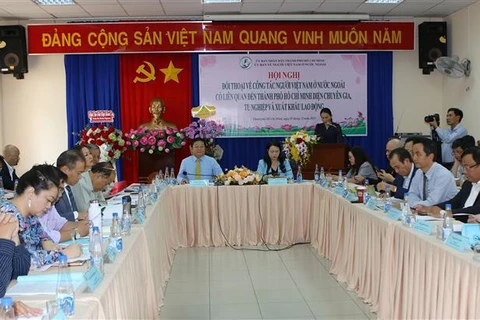 A delegation of overseas Vietnamese present books and gifts to children on Truong Sa Island. (Photo: VNA)
A delegation of overseas Vietnamese present books and gifts to children on Truong Sa Island. (Photo: VNA) In an interview granted to the Vietnam News Agency, Deputy Minister of Foreign Affairs Le Thi Thu Hang, who is also head of the State Committee for OV Affairs, said the OV community is a precious and highly potential resource that can make considerable contributions to national development. There are currently about 6 million OVs in more than 130 countries and territories, over 80% of which are developed nations.
OVs have not only integrated into and contributed to their new countries, but also helped nurture the friendship and trade ties and popularize images of Vietnam abroad, she noted.
She highlighted the four main areas in which OV resources can be mobilised to contribute to the homeland’s development.
The first is knowledge, science and technology, and high-quality human resources. About 10 - 12% of the community, or 600,000 people, hold bachelor’s or higher degrees.
Many are renowned scientists in new and high technology areas that Vietnam has demand for like information technology, electronics, telecommunications, manufacturing engineering, and biotechnology. Guest workers of Vietnam with vocational skills and experience also form a source of manpower for the homeland after returning from abroad.
The second is the economic resource, Hang continued, noting that present in most countries and territories around the world, Vietnamese entrepreneurs boast economic capacity and growing influence on their host countries.
Recent statistics show that OVs in 35 countries and territories have registered 1.72 billion USD for 385 foreign direct investment (FDI) projects in 42 of the 63 provinces and cities in Vietnam. Their presence can also be found in indirect or domestic investments.
Overseas remittances topped 190 billion USD between 1993 (the first year it was calculated) and 2022, approximating the sum of FDI disbursed during the period. The figure has increased year on year, even amid difficulties caused by the COVID-19 pandemic, turning Vietnam into one of the 10 countries with largest overseas remittances.
 Deputy Minister of Foreign Affairs Le Thi Thu Hang, who is also head of the State Committee for OV Affairs (Photo: VNA)
Deputy Minister of Foreign Affairs Le Thi Thu Hang, who is also head of the State Committee for OV Affairs (Photo: VNA) OVs are also serving as a bridge of culture, cuisine, and language, contributing to Vietnam’s diplomatic ties, people-to-people ties, and cultural exchanges with others, according to the Deputy FM.
Finally, the community is also a charitable and humanitarian resource. OVs have actively participated in charitable and humanitarian campaigns in the homeland, thereby substantially contributing to poverty reduction, disaster relief, and COVID-19 response.
Hang said the freshly approved plan will help mobilise OV resources for national development in the context of enhanced industrialisation and modernisation as Vietnam looks to establish itself as a developed and high-income nation by 2045.
It will promote the awareness of the important role of OVs in national development and safeguarding so as to build general, fundamental, and long-term orientations, guidelines, and measures for caring for, attracting, and maximising these resources.
The plan also identifies tasks for ministries, sectors, and localities, including creating a favourable environment for OVs to make contributions. It amends legal regulations to ensure OVs can benefit from a legal environment as equally as people in the homeland, and creates a sustainable mechanism to encourage them to contribute to national development.
It will also help consolidate and develop the OV network around the world and bring into play OV resources in the long term, the official added./.
VNA
